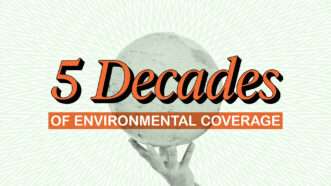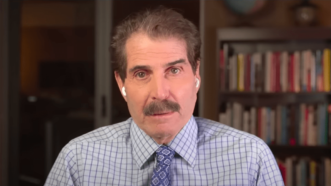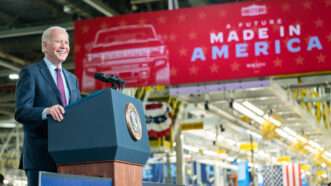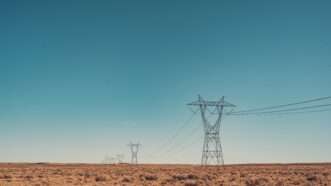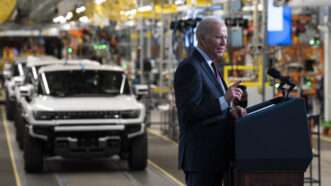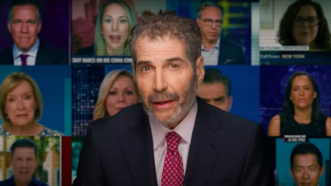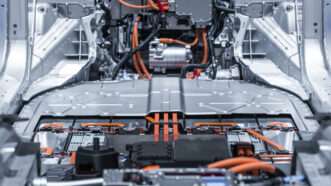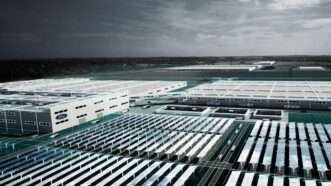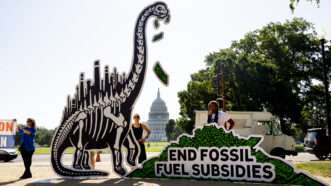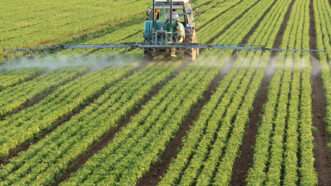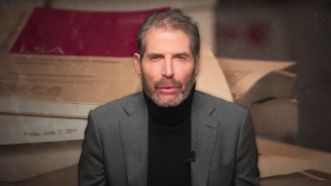Energy & Environment
Happy Earth Day! Reason Recycles 5 Decades of Environmental Coverage
A selection of Reason's most incisive articles on population, pollution, resource depletion, biodiversity, energy, climate change, and the ideological environmentalists' penchant for peddling doom.
How To Blow Up a Pipeline Unintentionally Indicts the Climate Movement's Fringe Activists
The movie wants to be a call to arms for climate activists. Instead, it portrays them as delusional, apocalyptic depressives.
The Push To Eliminate Fossil Fuels Is Hurting Poor People
"When we look at solar and wind around the world, it always correlates to rising prices and declining reliability."
Ninth Circuit Rules Berkeley Gas Hookup Ban Is Preempted
A local California ordinance prohibiting natural gas hookups in new construction conflicts with federal law according to a federal appellate court.
Biden's 'Buy American' Electric Vehicle Tax Credits Go Into Effect
The credits may be well-intentioned, but they will distort the market and lead to a windfall for U.S. companies.
California's Builders and YIMBYs at Loggerheads Over Bill Cracking Down on 'Unchecked Sprawl'
Activists who would like to see more housing built and people who build housing for a living would seem to be natural allies. A new bill in the California Legislature is driving them apart.
It Took 15 Years for the Feds To Approve a 700-Mile Electric Line
It'll be another five years before it's operational.
Energy Abundance Is Liberating Humanity From Grueling Labor
Robert Zubrin’s The Case for Nukes highlights the connection between energy and freedom.
The EPA's Ban of Gasoline-Powered Cars Will Actually Slow Development of Electric Cars
The Biden administration wants as many as two-thirds of all new vehicles sold in the U.S. by 2032 to be electric. But the market should decide how to make that switch.
Federal Court Halts Biden Administration's Clean Water Overreach
Hopefully the Supreme Court will soon put a permanent stop to the EPA's Clean Water Act land grab.
Georgia Is Shoveling Cash Into a Failing Electric Vehicle Company
In 2021, the state of Georgia made an expensive bet on an unproven company that could be headed for financial catastrophe.
The Media and Politicians Keep Trying To Censor Things That Turn Out To Be True
The COVID-19 lab leak theory was labeled "misinformation." Now it's the most plausible explanation.
Debate: Cats Are More Libertarian Than Dogs
Do felines contribute more to human liberty?
Electric Car Prices Are Falling, With or Without Tax Credits
The Inflation Reduction Act imposes byzantine requirements to qualify for the credits. Some automakers are simply ignoring them and finding other ways to lower prices.
California's Attacks on Big Oil Will Only Drive More People Out of the State
At least until all the gasoline is gone.
Review: Egg Is a Theory of Everything
The book's 12 thematic chapters are dense and rich—like flan, but good.
The Club of Rome's New Malthusianism-Lite Report
No overpopulation doom but humanity is still at risk by overstepping planetary boundaries.
Louisiana Loses Social-Cost-of-Carbon Lawsuit in the Fifth Circuit (Again)
The plaintiff states lack standing to challenge the Biden Administration's interim Social Cost of Carbon estimates
Tennessee Will Use Eminent Domain To Evict Black Farmers for Ford E.V. Factory
The state promised Ford nearly $900 million in incentives, including new and upgraded roads. But it chose to run that new road through a number of black-owned farms.
The Morally Funky Math of Homeowner Handouts
The rich are getting richer under the Inflation Reduction Act.
Police Traveled 500 Miles To Seize Girl's Pet Goat for Slaughter
A 9-year-old backed out of a deal to sell her pet goat for slaughter. Local officials and sheriff's deputies used the power of the state to force her to go through with it.
U.N. Climate Report Recommends Ending Fossil Fuel Subsidies
One place where environmentalists and libertarians are on the same page
Progressive Politicians Are Regulating Their Own Projects Into Oblivion
Excessive government interference in the market hurts consumers and thwarts policy goals. It also gets in the way of the government itself.
America Can Have More Clean Energy or More Toad-Protecting Regulations, but Not Both
Carbon-free power isn’t free of hard choices.
This Year's Farm Bill Threatens To Be a Bigger Monster Than Ever
The massive piece of legislation embodies all that is wrong with American lawmaking.
Federal Agencies Keep Failing To Legally Interpret the Clean Water Act
The Biden administration is the third administration in a row to fail to issue Clean Water Act regulations that pass judicial scrutiny.
A Town Without Zoning Fights To Stay Free
In Caroline, New York, officials are trying to impose the city's first zoning code. These residents won't have it.
Oil Companies Fail to Convince the Eighth Circuit Climate Cases Should Be Removed to Federal Court (Updated)
The Eighth Circuit joins the First, Third, Fourth, Ninth, and Tenth in rejecting the arguments for removal, but Judge David Stras writes an interesting concurrence.
The Inflation Reduction Act Is Screwing Up the Market for Electric Vehicles
Volkswagen unveiled a cheap new electric concept car, but protectionist policies mean it's not worthwhile for the company to introduce it in the U.S.
FDA Says Lab-Grown Chicken Is Safe To Eat
"The future of our planet depends on how we feed ourselves…and we have a responsibility to look beyond the horizon for smarter, sustainable ways to eat," says GOOD Meat's CEO.
Biden's First Veto Protects and Promotes ESG
What at first appears to be deregulation is actually economic activism in disguise.
Is the 'Climate Time-Bomb' Really Ticking Toward Imminent Catastrophe?
Climate change is a problem, but the IPCC AR6 Synthesis Report is wrong to suggest that humanity is on the brink of catastrophic warming.
China's Purchases of U.S. Land Stoke Bipartisan Panic, Just Like Japan's Did In the 1980s
People panicked in the 1980s that Japan's economic largesse posed a grave threat to American interests. Then the market reined it in.
Great Moments in Unintended Consequences: Subsidized Trees, Day Care Late Fees, New York Alcohol Ban (Vol. 11)
Good intentions, bad results.
Biden's New Budget Would Hike Taxes and Wage Class Warfare
The higher taxes on small businesses and entrepreneurs could slow growth. Less opportunity means more tribalism and division.
Flaco, New York City's Escaped Owl, Is a Flying Free-Range Metaphor
In just two weeks, he has learned to hunt and survive. There's a lesson there.
North Carolina Using Eminent Domain To Seize Homes and a Church for Electric Car Factory
Under the Kelo v. New London Supreme Court decision, a state can take private land to give to a private developer for almost any reason it wants.
Is This the Year California's Development-Killing Environmental Review Law Sees Serious Reform?
Yet another court decision stopping a U.C. Berkeley housing project is getting California's policy makers to think bigger about reforming the infamous California Environmental Quality Act.
America Needs a Better Kind of Capitalism
Big corporations and entire industries constantly use their connections in Congress to get favors, no matter which party is in power.
Meet the Students Pushing Back Against Socialism
"It's very easy for politicians to legislate freedom away," says Northwood University's Kristin Tokarev. "But it's incredibly hard to get back."
The Luddites' Veto
Beware of activists touting "responsible research and innovation." The sensible-sounding slogan masks a reactionary agenda.
The Government Is Subsidizing Microchip Firms—While Making It More Expensive To Produce Microchips
Politicians say they want to subsidize various industries, but they sabotage themselves by weighing the policies down with rules that have nothing to do with the plans.


